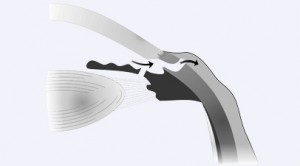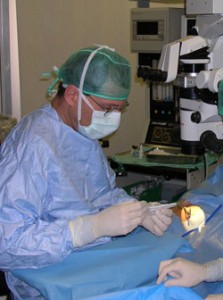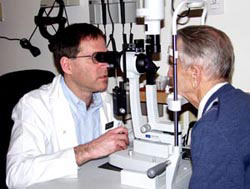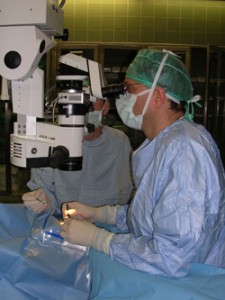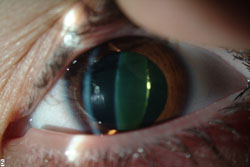Cataract surgery is perhaps the most common type of surgery preformed today. This surgery demonstrates a very high level of safety when compared to almost any other surgery performed.
If we were to pool and analyze a very large number of surgeries performed, perhaps a hundreds thousand cataract surgeries done, we could calculate the average risk of an adverse event, problem, or complication might occur either during or following the surgery. If we were to exclude eyes that have additional diseases on top of the cataract (such as glaucoma, retinal problems, corneal opacity, etc.), we would find that for the remaining healthy eyes there is a probability of under 5% that a significant problem will arise. From the above we can conclude that in the eye with the cataract, there is over 95% chance that the surgery will be run smoothly.
Still, for each 1000 people undergoing the surgery, perhaps 50 will suffer some type of adverse event, while 950 or more will run a smooth course. What happened to those who suffered a complication related to the surgery? Well, the most severe complications that might occur include a bacterial infection within the eye, bleeding within the eye, retinal detachment, an inability to remove the cataract as a whole, an inability to implant a lens, or the need for additional surgeries in an attempt to fix the adverse event. In those eyes in which such a complication occurs, there are often both medicinal and surgical means that a surgeon can perform in order to minimize as much as possible the risk of severe damage and the resulting damage to vision in that eye. These potential complications are risks that might occur in any cataract surgery , even completely uneventful and performed by the best of surgeons. What good surgeons do is to improve their technique and performance to a point that such complications occur as infrequently as possible. But, it is important to understand that no surgeon or technique is risk-free, and complications cannot be entirely avoided.
Prior to the surgery the surgeon will assess weather or not the surgery is considered high risk and will do the maximum in order to reduce the risk factors as much as possible. Such actions include, mainly, changing the technique to tailor it to the individual eye, in order to offer the patient the highest chances for success.
It is important to emphasize that what has been mentioned up till now relates to healthy eyes with cataract, eyes that beyond the development of a cataract that needs removal do not suffer from any other significant eye disease. A different grouop of eyes includes those eyes that in addition to the cataract harbor additional problems, such as, glaucoma (and particularly eyes that were operated for glaucoma), eyes that have had a corneal transplant, eyes with an intra ocular tumor, eyes that have been badly traumatized, or have have been subjected to other surgeries in the past, such as a retinal surgery. In these cases there is a much higher level of risk related to the cataract surgery than has been discussed above, and these cases demand special expertise of doctors who are skilled in operating such eyes. Usually these patients are already under the care of an experienced ophthalmologist and in case they develop a cataract in the future their doctor will be able to either perform the cataract surgery himself/herself, or else refer the patient to an experienced ophthalmic surgeon.
After this thorough discussion of risks and complications, it is important to note that the vast majority of cataract surgeries performed end highly successfully, and only a small, unfortunate, fraction encounter adverse events which demand additional care and/or surgeries, and from those, a smaller fraction lose significant vision.

